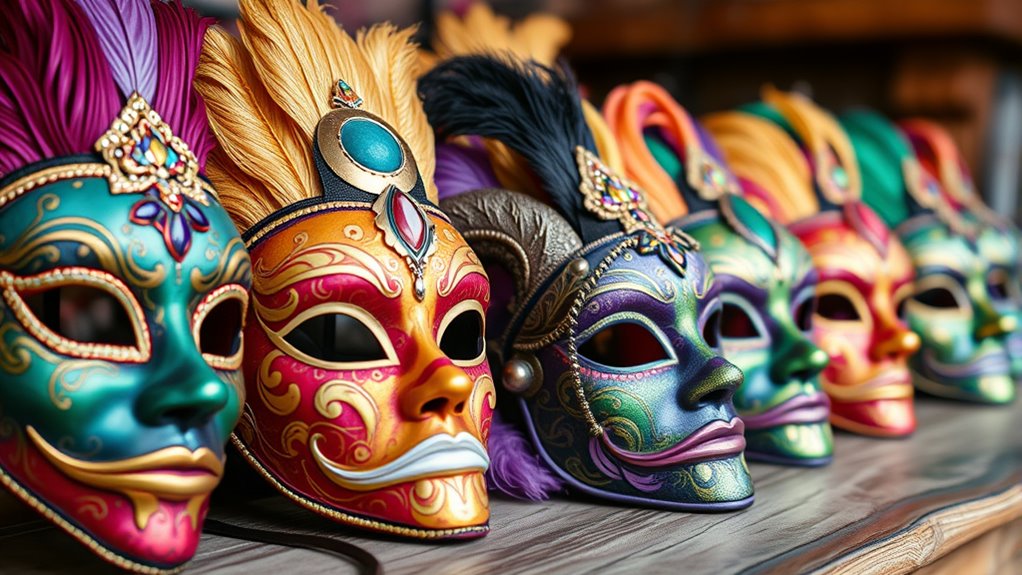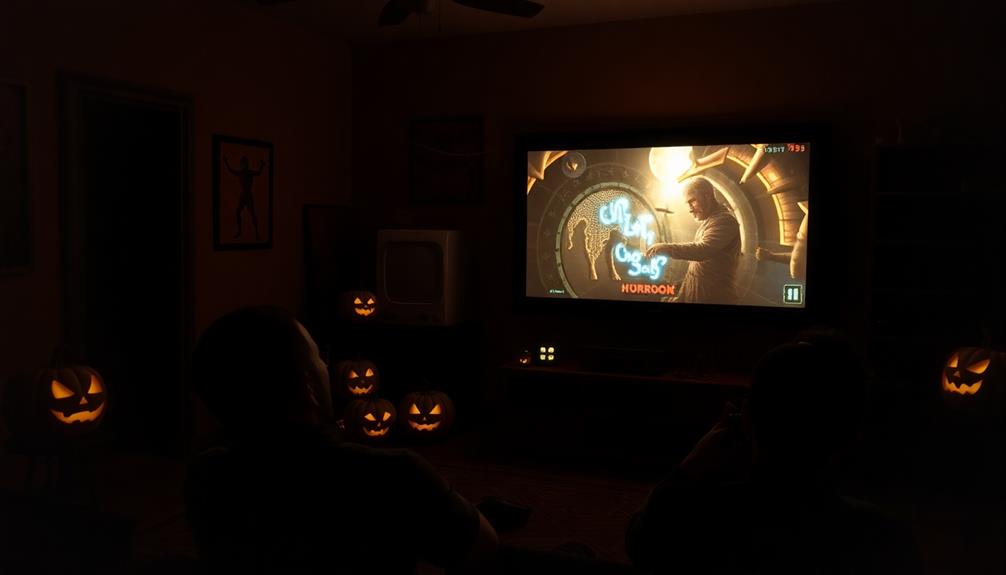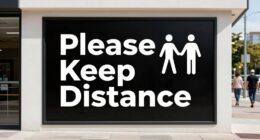Masks allow you to explore different aspects of your identity and express yourself creatively. When you wear a mask, you can embody roles or traits you might usually hide, helping you feel protected or freer to connect with others. They also serve as symbols that influence how others perceive you, guiding social interactions. If you’re curious how masks can help you understand yourself better or reveal hidden parts of your personality, more insights await you.
Key Takeaways
- Masks enable exploration of different identities, fostering self-discovery and emotional expression through role-play and symbolic transformation.
- Wearing masks provides psychological protection, reducing social anxiety and allowing individuals to experiment with traits safely.
- Masks serve as tools for identity concealment or affirmation, influencing how others perceive and interpret personal and cultural roles.
- The act of masking encourages playful experimentation, promoting creativity, spontaneity, and liberation from personal constraints.
- Virtual and physical masks facilitate a sense of control over self-presentation, enabling playful exploration of multiple facets of identity.
The Historical Significance of Masks in Human Cultures
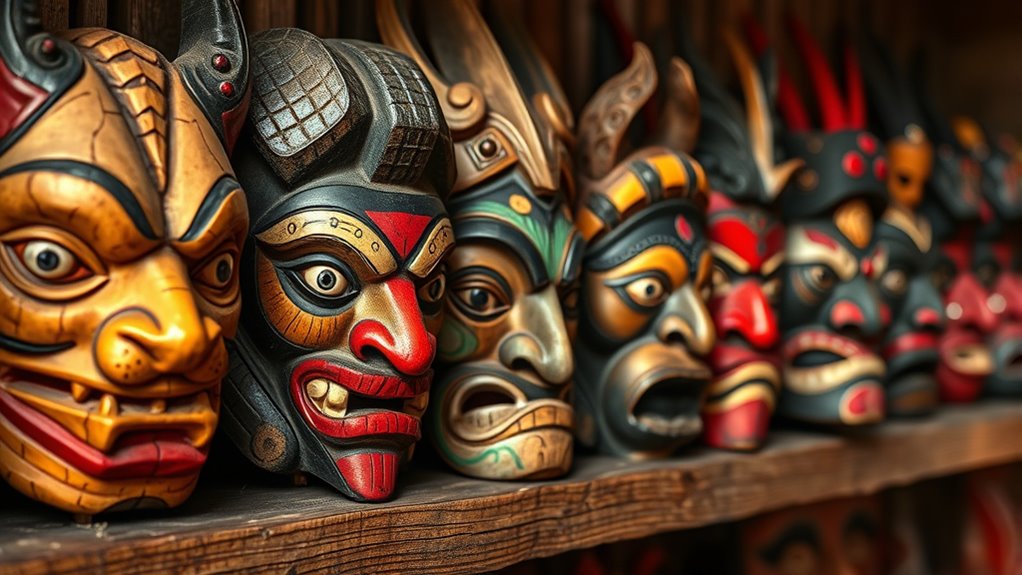
Have you ever wondered why masks hold such deep meaning across different cultures? They’ve long been central to ritualistic symbolism, embodying spiritual beliefs and societal values. In many cultural ceremonies, masks serve as a bridge between the human and the divine, channeling ancestors or gods. Ancient civilizations like Egypt, Greece, and Africa used masks to honor deities, mark rites of passage, or ensure protection. These masks often carry specific designs, colors, and materials that communicate complex meanings. Wearing masks in ceremonies wasn’t just about concealment but about transformation, allowing individuals to embody different identities or spirits. Throughout history, masks have helped communities preserve their traditions, reinforce social roles, and connect with the sacred, making them powerful symbols woven into the fabric of human culture. Additionally, masks have been used as sociocultural tools to express identity, status, or group affiliation within societies.
Psychological Reasons Behind Wearing Masks

People often wear masks not just for cultural or ceremonial reasons but also to fulfill psychological needs. Wearing a mask can serve as a form of cultural symbolism, allowing you to embody qualities or traits associated with a particular role or tradition. It also acts as a psychological defense, providing a barrier between your true self and external judgments. Masks can help you feel safer in social situations, reducing anxiety or vulnerability. They enable you to explore different facets of your personality without fear of repercussions. This psychological mechanism offers comfort and control, especially when facing uncertainty or stress. Ultimately, masks fulfill deep-seated needs for protection, self-expression, and belonging, making them powerful tools beyond their cultural significance. Additionally, the use of masks in offensive security measures like ethical hacking reflects the importance of adopting different perspectives to identify vulnerabilities effectively.
Masks and the Concept of Identity

Masks serve as powerful tools for shaping and expressing your sense of identity. They allow you to explore different facets of yourself through cultural symbolism, revealing or concealing certain traits. When you wear a mask, you’re engaging in a psychological defense, protecting your true self from judgment or vulnerability. Consider these points:
- Masks often symbolize cultural values, connecting you to traditions.
- They help you project desired qualities, shaping how others see you.
- Wearing a mask can serve as a psychological defense against insecurities.
- They enable experimentation with different identities, fostering self-awareness.
- The design and choice of a mask can influence your resale value, reflecting how certain styles or brands hold cultural significance.
The Role of Masks in Social Dynamics and Interaction

In social interactions, masks serve as strategic tools that influence how you connect with others and navigate various group dynamics. They often carry cultural symbolism, representing shared beliefs, traditions, or values that shape your behavior and perceptions. Masks can also reinforce or challenge social hierarchy, signaling your role, status, or intentions within a group. For example, a formal mask might denote authority, while a playful or exaggerated mask encourages openness or humor. By choosing specific masks, you communicate unspoken social cues, helping you manage impressions and navigate complex relationships. Masks therefore act as social signifiers, enabling you to adapt to different contexts and expectations while subtly influencing the power dynamics at play. Additionally, the use of masks in social settings is increasingly supported by AI security technologies that analyze behavioral patterns, revealing underlying social signals and enhancing understanding of group interactions.
Masks as Tools for Self-Expression and Creativity
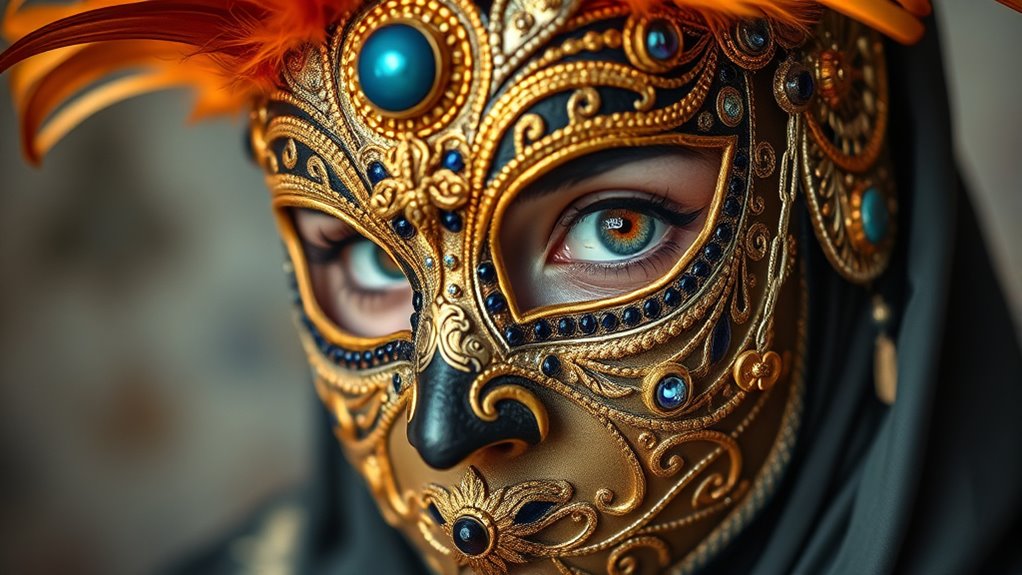
Masks allow you to express different facets of your identity and showcase your creativity. They inspire artistic exploration and help you break free from everyday constraints. Wearing a mask can also encourage you to be playful and embrace spontaneity. Additionally, exploring various masks can provide insight into regional cultural differences, enriching your understanding of diverse expressions of identity.
Enhancing Personal Identity
Have you ever noticed how donning a mask can transform your sense of self? Masks serve as powerful tools for enhancing personal identity by allowing you to explore different facets of yourself. When you wear a mask, it influences how others recognize you through facial recognition, often highlighting or concealing specific features. Additionally, masks carry cultural symbolism that connects you to traditions or communities, deepening your sense of belonging. To effectively enhance your identity, consider these aspects:
- Choose designs that reflect your inner self or aspirations
- Use masks to challenge or reinforce your social roles
- Incorporate symbols that resonate with your cultural background
- Experiment with styles to discover new dimensions of your personality
- Understanding how masks influence perception and recognition can enrich your self-expression facial recognition.
Fostering Artistic Expression
By experimenting with different mask designs, you open new avenues for self-expression and creativity. Masks serve as powerful symbols, embodying mask symbolism that can convey emotions, beliefs, or personal stories. They also connect you to cultural rituals, where masks are used to honor traditions or tell ancient tales. Creating or adapting masks allows you to explore your artistic abilities, blending colors, materials, and shapes to craft meaningful pieces. This process encourages you to think beyond everyday expression, tapping into deeper layers of identity and imagination. Whether for performance, art projects, or personal reflection, masks become tools that foster your artistic growth. They enable you to translate inner feelings into visual forms, expanding your creative horizons through cultural and symbolic significance. Additionally, understanding the environmental impacts of foraging can inspire you to incorporate sustainable practices into your art, emphasizing harmony with nature.
Encouraging Playfulness
How can you tap into your natural sense of playfulness through mask-making? Embracing childlike wonder and spontaneous creativity allows you to explore new facets of yourself. To boost playfulness, try these approaches:
- Use unexpected materials—think feathers or glitter—to spark curiosity.
- Let go of perfection, focusing instead on fun and experimentation.
- Incorporate vibrant colors that evoke joy and spontaneity.
- Allow yourself to improvise, creating masks that express different moods or characters.
- Remember that artistic expression can be a powerful way to explore and understand your identity through playful experimentation.
The Impact of Masks on Emotional Regulation

Masks can considerably influence how you regulate your emotions, often acting as a barrier or a bridge to expressing feelings. When you wear a mask, it may help you hide vulnerability and maintain composure, aiding in emotional regulation during stressful situations. Conversely, masks can also disconnect you from your true mood, making mood management more challenging because you might suppress feelings rather than process them. This dual role affects your ability to respond appropriately to emotional stimuli. Sometimes, wearing a mask provides a sense of control, allowing you to manage intense emotions more effectively. However, overreliance on masks might hinder genuine emotional understanding, creating distance from your authentic feelings. Additionally, understanding the impact of emotional regulation solutions can help you develop healthier ways to process your emotions. Ultimately, masks shape your emotional landscape, influencing how you navigate your internal world.
Masks and the Desire for Escape or Anonymity

Wearing a mask often serves as a tool for seeking escape or maintaining anonymity in social situations. You might don a mask to hide your true identity or to step outside everyday roles. Cultural symbolism and ritual significance deepen this desire, as masks connect you to traditions, beliefs, and collective identities. They allow you to:
Masks serve as symbols of escape, identity, and cultural connection in social and ritual contexts.
- Escape societal expectations temporarily
- Adopt a different persona or role
- Participate in rituals that foster group cohesion
- Conceal personal vulnerabilities or insecurities
This craving for anonymity isn’t just about hiding; it’s about embracing a different aspect of yourself, often rooted in cultural or spiritual meaning. Masks provide a safe space for play, exploration, and liberation from personal constraints. Additionally, cultural symbolism enhances the emotional resonance and significance of mask-wearing, fostering a sense of belonging and shared identity.
The Influence of Masks on Perception and Judgment
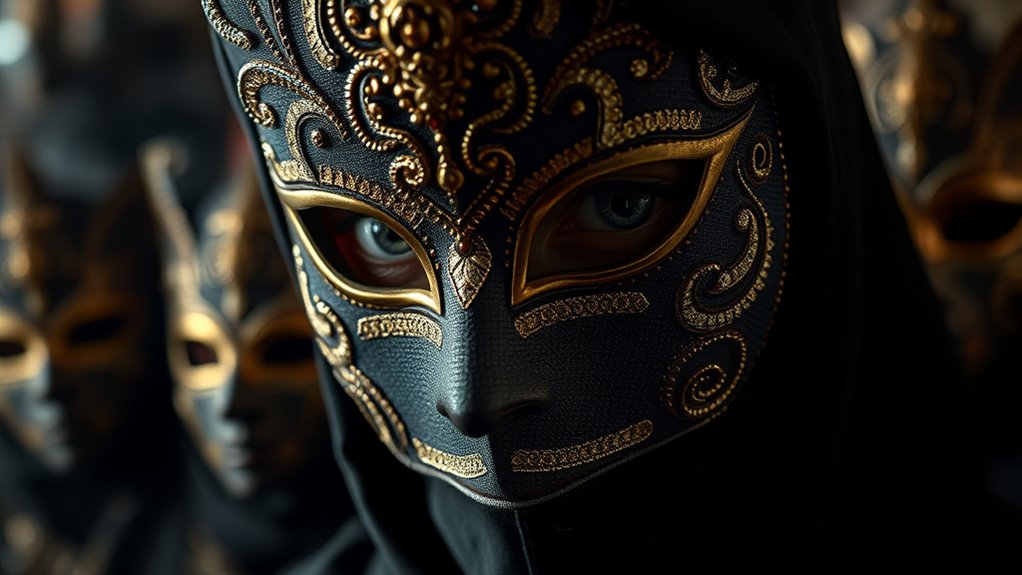
Because appearances can profoundly influence your perceptions, masks shape how others interpret your identity and intentions. When you wear a mask, you engage in perception manipulation, guiding others to see a specific version of you. This can lead to bias influence, where preconceived notions color judgments based on the mask’s appearance. For example, a stern mask may evoke authority, while a playful one invites approachability. Masks can distort reality, making it easier for others to jump to conclusions or misjudge your true feelings. As a result, perception and judgment become filtered through the mask’s symbolism rather than your authentic self. Understanding how visual cues impact social interactions helps you recognize how masks strategically shape perceptions, often serving as tools to manipulate perceptions intentionally or unconsciously.
Masks in Therapy and Personal Growth
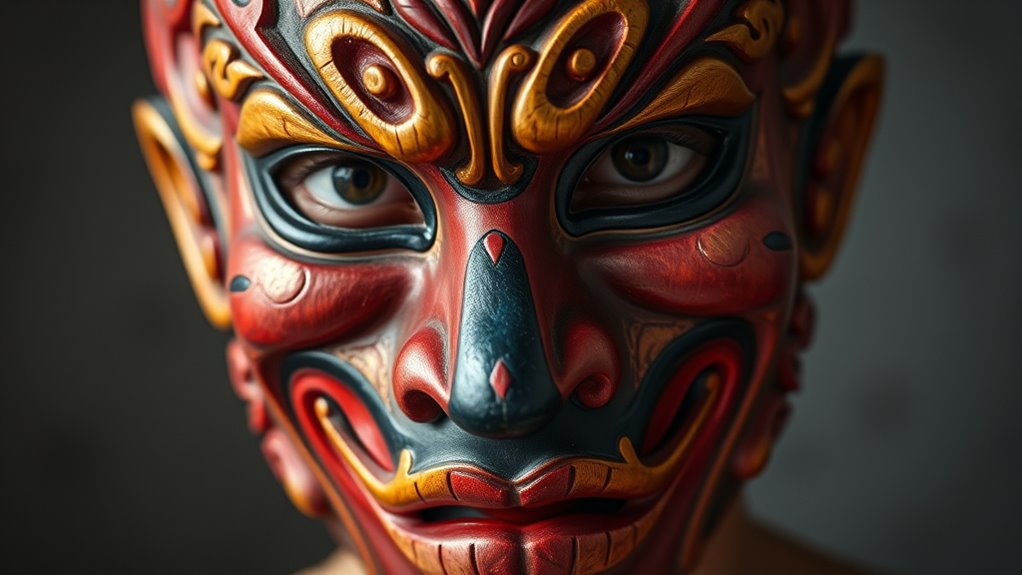
In therapy and personal growth, masks serve as powerful tools for exploring and understanding your inner self. They embody cultural symbolism and are often used in ritual practices to facilitate transformation. Masks help you:
- Express emotions you might not openly share
- Confront aspects of your identity safely
- Engage in symbolic acts that promote healing
- Break free from limiting beliefs through role-play
- Recognize how security measures in payment processing protect your personal information during online interactions.
Future Trends: Masks in Technology and Virtual Reality

As technology advances, you’ll see masks evolve into virtual avatars and personas, allowing you to explore different aspects of yourself. Augmented reality experiences will enable you to interact with digital layers seamlessly integrated into the real world. With digital identity customization, you can craft and control how you present yourself across various virtual platforms. Additionally, embracing sustainable practices in digital design can help reduce environmental impact as these technologies become more widespread.
Virtual Avatars and Personas
Virtual avatars and personas are rapidly evolving, blending psychology with cutting-edge technology to redefine self-expression in digital spaces. You can craft identities that reflect cultural symbolism or make bold fashion statements, creating a sense of play and exploration. To harness this, consider these points:
- Cultural symbolism influences avatar design, connecting users to heritage or social themes.
- Fashion statements allow for unique, personalized expressions beyond physical constraints.
- Personas serve as masks that reveal or conceal aspects of your identity.
- Virtual environments offer a playground for experimenting with different versions of yourself.
- The use of masks in technology can facilitate emotional expression and social interaction within digital realms.
Augmented Reality Experiences
Augmented reality experiences are transforming how you interact with digital masks, blending physical and virtual worlds in real time. With augmented reality, you can see virtual masks overlaid onto your own face or surroundings, creating immersive experiences that feel remarkably real. This technology allows for dynamic customization and playful experimentation, making mask-wearing more engaging and interactive. As augmented reality advances, these immersive experiences will become more seamless, offering new ways to express yourself and explore different identities without physical constraints. You’ll find yourself immersed in environments where digital masks enhance social interactions, entertainment, and even self-discovery. Additionally, understanding the nutritional advantages of green juice can inspire healthier lifestyle choices, which can also influence how you perceive and present your identity. This trend pushes the boundaries of traditional mask use, making virtual and augmented experiences central to how we understand and explore identity today.
Digital Identity Customization
Digital identity customization is quickly becoming a defining feature of future technology, allowing you to craft and refine your online persona with unprecedented ease. You can now choose digital masks that reflect your personality, cultural symbolism, or fashion statements. This trend offers: 1. Personal expression through virtual masks that symbolize cultural heritage or beliefs 2. The ability to experiment with different looks without physical limitations 3. Enhanced social interactions with avatars that mirror your evolving identity 4. Opportunities for playful identity exploration in immersive environments Support hours vary, providing timely assistance for users navigating these innovative features.
Frequently Asked Questions
How Do Masks Influence Our Subconscious Perceptions of Others?
Masks influence your subconscious perceptions of others through facial concealment, which can lead to assumptions about identity, emotions, or intentions. When you see someone wearing a mask, your mind automatically forms subconscious associations, often based on cultural or personal experiences. This can cause you to interpret their behavior differently, sometimes projecting traits or emotions that aren’t actually there, highlighting how masks shape your perceptions beneath conscious awareness.
Can Wearing Masks Improve Interpersonal Empathy and Understanding?
Wearing masks can indeed enhance your interpersonal empathy and understanding. They encourage you to focus on facial expressions and emotional projection, helping you interpret others’ feelings more accurately. Masks strip away distractions, allowing you to connect on a deeper level beyond words. By engaging with masked interactions, you become more sensitive to subtle cues, fostering empathy and strengthening connections through better recognition of emotions and intentions.
What Role Do Cultural Differences Play in Mask Symbolism?
Oh, because cultural expressions are just a one-size-fits-all costume shop, right? Not quite. You’ll find that mask symbolism varies wildly across cultures, reflecting diverse beliefs and values. In some societies, masks symbolize spirits or ancestors, while in others, they’re mere entertainment. This symbol diversity shows you that masks serve different purposes globally, emphasizing the importance of understanding cultural nuances instead of assuming they mean the same everywhere.
How Do Masks Affect Long-Term Psychological Well-Being?
Masks can impact your long-term psychological well-being by offering mask anonymity and emotional concealment, which may help you cope with stress or social anxiety. However, overusing masks might hinder genuine connections, leading to feelings of isolation or identity confusion. Balancing masked interactions with authentic expressions ensures you maintain mental health, allowing emotional vulnerability and trust to flourish without relying excessively on masks for protection.
Are There Neurological Changes Associated With Mask-Wearing Practices?
Wearing masks can lead to neural plasticity, causing your brain to adapt to new social cues and environments. You might notice changes in brain activation, especially in areas related to emotion, identity, and social interaction. These neurological shifts help you process masked interactions more efficiently over time. While generally beneficial, prolonged mask-wearing could also influence how your brain responds to face recognition and emotional cues, impacting social cognition.
Conclusion
As you lift the mask, you step into a new domain of self-discovery and play. Each layer peels away, revealing hidden facets and unspoken truths. Masks become your canvas, blending history with present moment, illusion with reality. In this dance of identity and disguise, you find freedom—an endless rhythm of expression and transformation, where who you are and who you can become swirl together in a timeless, vibrant flow.
